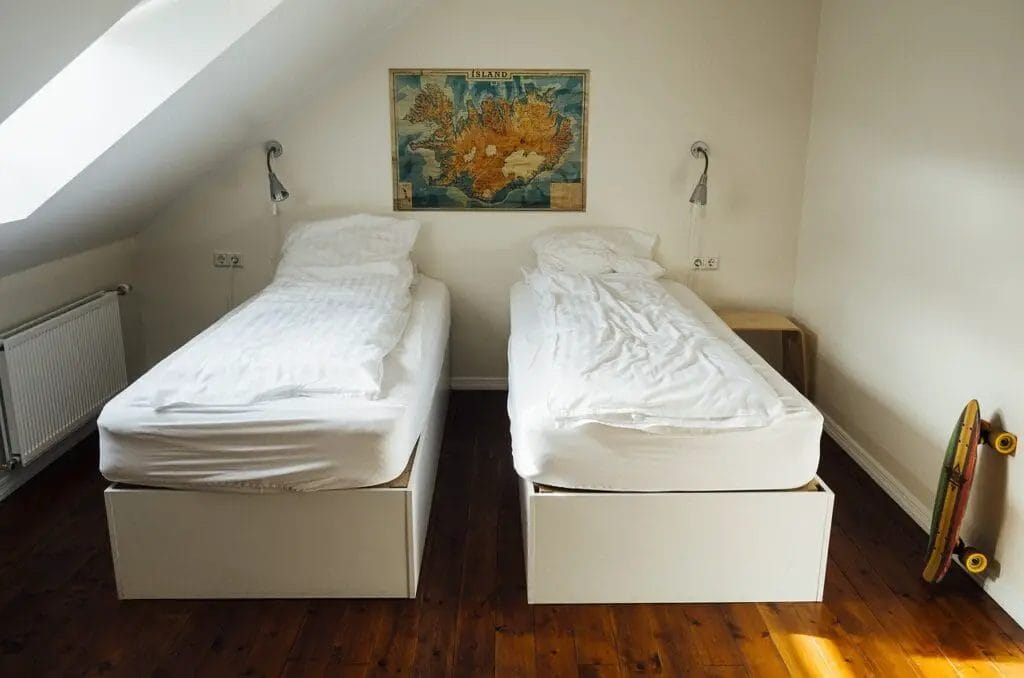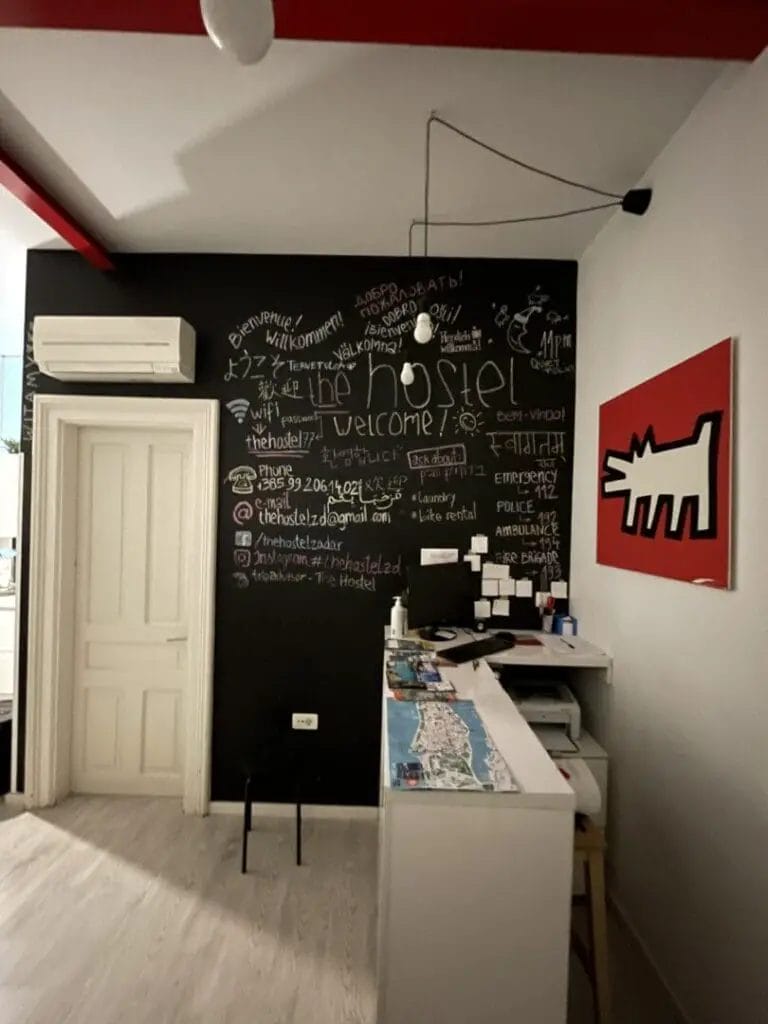Dorm Vs Hostel – Everything You Should Know
When you are talking about budget-friendly accommodation for travellers and backpackers, a Hostel is often something which comes as the first choice compared to Hotels.
But are you aware that you can also book a single room in a hostel compared to staying in the shared dorm which is often the cheapest choice when staying in a Hostel.
In this post, I will compare Dorm vs. hostel and will try to highlight all the things which you should look for when booking your next Hostel in Europe.
Having stayed in both a Dorm and a Private room in the Hostel throughout exploring Europe I can help you highlight the best of both worlds.
So without much wait let me try to compare Dorm Vs Hostel
What is a Dorm?
So I am pretty sure you are aware of What is Dorm and that is the reason why you are comparing it against the Hostel but for those who is not.
These are shared Bunk Beds which you get while exploring some of the big attractions and locations. These are shared rooms starting from 4 all the way to 16/20 travellers sometime same gender, some times mixed.
You can check in the description when booking that.
It is something which is very common when you are backpacking in Europe as you get fairly easy accommodation on a budget.
When you are exploring websites like Hostelworld / Booking and looking for booking the hostels you will be thrown with this selection while booking.
What are hostel private rooms?

Private rooms are more like hotel rooms but without any bathroom attached to them. You also don’t get the feature of daily clean up of the room.
In contrast to a dormitory, a private room in a hostel typically offers single, double, or multiple beds (without bunk beds!) depending on the room type. Some hostels may also provide additional amenities like an en-suite bathroom, a desk, and occasionally even a television.
Choosing a private room in a hostel allows travellers to have the convenience and privacy of their own space while still enjoying the social atmosphere and facilities offered by the hostel. This option is perfect for travellers who want to strike a balance between having their own privacy and the chance to interact with fellow travellers in shared areas such as common spaces or communal kitchens.
When I was travelling in Croatia and exploring the beautiful city of Sibenik I stayed in one of the Private Rooms of the Globo Hostel and it was really good. The best was the location of the Hostel as it was right next to the Bus stand of Sibenik.
Benefits of Staying in a Dorm
Staying in a dorm can offer several benefits:
- Community and Social Interaction: Living in a dorm allows you to be part of a close-knit community. It provides ample opportunities to meet and interact with fellow students, fostering friendships and social connections that can last throughout your college years and beyond.
- Convenience: Dorms are usually located on or near campus, making it convenient to attend classes, access academic resources, and participate in extracurricular activities. You can save time and money on transportation, and have easy access to campus facilities such as libraries, labs, and sports facilities.
- Academic Support: Many dorms have study lounges or designated quiet areas where you can focus on your studies. Living with other students who are pursuing similar academic goals can create a supportive environment for learning and collaboration.
- Personal Growth and Independence: Living in a dorm can be a stepping stone towards independence. It provides an opportunity to learn important life skills such as time management, budgeting, and problem-solving. You will have more responsibility for managing your daily routines and making decisions about your living space.
- Cultural Diversity: College dorms often bring together students from various backgrounds and cultures. Living with people from different regions or countries can expose you to new perspectives, customs, and traditions, promoting cultural understanding and appreciation.
- Access to Resources: Dorms typically offer amenities like high-speed internet, laundry facilities, communal kitchens, and common areas for socializing. These resources can make your daily life more convenient and comfortable.
- Personal Development Programs: Many dorms organize workshops, seminars, and events focused on personal development and life skills. These programs could include topics like stress management, career planning, wellness, and leadership development.
- Safety and Security: Dormitories often have security measures in place to ensure the safety of residents. This can include secure entrances, surveillance systems, and resident advisors who can assist in case of emergencies.
Downside of Staying in a Dorm
- Lack of privacy: Dorm rooms are typically shared with one or more roommates, which means you may have limited personal space and privacy. It can be challenging to find alone time or study without distractions.
- Noise and disturbances: Dorms can be noisy and chaotic, especially during peak times. The constant activity and socializing can make it difficult to concentrate or get a good night’s sleep.
The worst of all is that sometimes you have to go through the worst of the travellers like when I was travelling in Split I came across a stinky traveller and the downside of it was that I had to start staying at the place after making complaints to the owner. - Limited space: Dorm rooms are usually small and have limited storage space. This can make it challenging to keep your belongings organized and find space for all your essentials.
- Lack of amenities: Depending on the dorm, you may have limited access to amenities such as a kitchen or laundry facilities. Sharing these amenities with a large number of people can be inconvenient and time-consuming.
- Rules and regulations: Dorms often have strict rules and regulations that you must adhere to. These rules can dictate everything from quiet hours to guest policies, limiting your freedom and flexibility.
- Social challenges: While dorms offer opportunities for social interaction, they can also present social challenges. Living in close proximity to others with different habits and lifestyles can lead to conflicts and disagreements.
- Lack of personalization: Most dorms have restrictions on how you can decorate your room. This can limit your ability to create a personalized and comfortable living space.
Benefits of Staying in a Private Room
There are several benefits of staying in a private room:
- Privacy: Staying in a private room ensures that you have your own personal space where you can relax and unwind without any interruptions.
- Comfort: Private rooms often provide more comfort compared to shared accommodations. You can have a comfortable bed, ample storage space, and sometimes even additional amenities like a private bathroom or balcony.
- Security: Private rooms offer enhanced security as you have control over who enters your space. This can give you peace of mind and make you feel more secure during your stay.
- Flexibility: Staying in a private room gives you the flexibility to set your own schedule and have more control over your environment. You can come and go as you please without worrying about disturbing others.
- Personalization: Private rooms allow you to personalize your space according to your preferences. You can decorate it, arrange your belongings, and create a cozy atmosphere that feels like home.
- Peace and Quiet: If you value peace and quiet, a private room is an ideal choice. You can enjoy a peaceful environment without the noise and potential disruptions that come with shared accommodations.
- Better Sleep: Having a private room means you can have a good night’s sleep without being disturbed by other guests. This is especially important if you are a light sleeper or need quality rest during your stay.
- Increased Focus: Staying in a private room can help you focus on your work or personal activities without distractions. It provides a conducive environment for concentration and productivity.
- Personal Space: A private room gives you the luxury of having your own personal space where you can relax, read, or engage in activities that you enjoy without feeling crowded or restricted.
- Quality Time: If you are traveling with a partner or loved one, staying in a private room allows you to spend quality time together in a more intimate setting.
Downside of Staying in Private Room
- Higher cost: Private rooms typically come with a higher price tag compared to shared accommodations. If you’re on a budget, staying in a private room may not be the most cost-effective option.
- Limited social interaction: Staying in a private room means you won’t have the opportunity to meet and interact with other travelers. If you enjoy meeting new people and sharing experiences, staying in a private room may feel isolating.
- Potential for less amenities: In some cases, private rooms may not have the same amenities as shared accommodations. For example, you may not have access to a communal kitchen or common areas that foster socialization.
- Less local insight: When staying in a shared accommodation, you can often get valuable recommendations and insights from fellow travelers or the host. In a private room, you may miss out on this local knowledge.
- Limited space: Private rooms are generally smaller in size compared to shared accommodations. If you prefer more space or have specific needs, such as working or exercising, a private room may not offer enough room for these activities.
- Possible lack of security: Depending on the accommodation, private rooms may have less security compared to shared spaces. It’s important to research and choose reputable accommodations to ensure your safety and peace of mind.
How to decide between a Dorm Room and a Private Room?
Deciding between a dorm room and a private room depends on several factors. Here are some considerations to help you make a decision:
- Privacy: If you value privacy and personal space, a private room would be a better choice. It allows you to have your own space where you can study, relax, and have personal belongings without sharing them with others. On the other hand, if you enjoy socializing and don’t mind sharing common areas, a dorm room can provide a more communal living experience.
- Budget: Consider your budget when choosing between a dorm room and a private room. In most cases, dorm rooms tend to be more affordable than private rooms since the cost is divided among roommates. Private rooms, on the other hand, are generally more expensive but offer the advantage of not having to share the expenses with others.
- Lifestyle and Preferences: Think about your lifestyle and preferences. If you prefer a quieter environment for studying and sleeping, a private room may be more suitable. However, if you enjoy being around people and making new friends, a dorm room can provide more opportunities for social interactions.
- Roommate Compatibility: In a dorm room, you will likely have one or more roommates. Consider whether you are comfortable sharing a living space with others and whether you have compatible lifestyles, habits, and schedules. If you prefer more control over your living environment, a private room eliminates the need to deal with potential roommate conflicts.
- Amenities and Facilities: Take into account the amenities and facilities offered in each option. Dorm rooms often provide shared facilities such as kitchens, bathrooms, and common areas. Private rooms may come with additional amenities such as en-suite bathrooms or kitchenettes, depending on the accommodation.
Conclusion – Dorm Room Vs Private Room
It ultimately depends on your personal preferences and priorities. Here are some factors to consider when comparing dorm rooms and private rooms:
- Cost: Dorm rooms are generally more affordable than private rooms. If you’re on a tight budget, a dorm room may be a more economical choice.
- Privacy: Private rooms offer more privacy compared to dorm rooms, where you’ll be sharing the space with other roommates. If you value your privacy and personal space, a private room may be more suitable for you.
- Social Interaction: Dorm rooms provide opportunities for socializing and building friendships with other students. If you enjoy a communal living environment and want to be surrounded by peers, a dorm room can offer a more social experience.
- Noise Level: Dorm rooms can be noisy due to the presence of other students nearby. In contrast, private rooms offer a quieter environment, which may be beneficial if you prefer a calm and peaceful living space.
- Facilities and Amenities: Private rooms often come with additional amenities such as private bathrooms, kitchenettes, and study areas. Dorm rooms typically have shared facilities, which may require coordination and compromise with roommates.
- Flexibility: Private rooms generally offer more flexibility in terms of personalization and freedom to decorate the space according to your preferences. Dorm rooms may have more restrictions on personalization due to shared living arrangements.
Packing List for Staying in a Dorm
Here’s a quick packing list for staying in a dorm:
- Bathroom essentials: Towels, shower caddy, toiletries
- Cleaning supplies: Disinfecting wipes, laundry detergent, trash bags
- Electronics: Laptop and charger, power strip/surge protector
- Personal items: Clothes, shoes, pyjamas, backpack or tote bag
- Miscellaneous: Fan or space heater (depending on climate), first aid kit, umbrella
Remember to check any specific guidelines or restrictions from your dormitory or university.
Get your Notion Travel Planner Template!
Embark on your next adventure with the Wanderlust Planner, the ultimate Notion Travel Planner Template. Organize your wanderlust-fueled dreams and turn them into unforgettable journeys. Whether you’re a seasoned globetrotter or a newbie explorer, this template has you covered.








